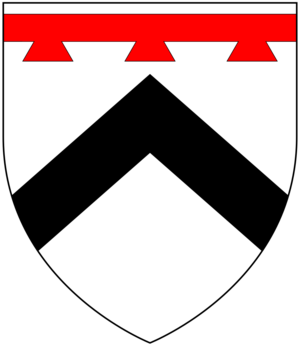Edmund Prideaux (Roundhead) facts for kids
Edmund Prideaux (died 1659) was an important English lawyer and a member of Parliament. He lived during a very exciting and difficult time in English history, the English Civil War. He supported the Parliament against King Charles I. He was briefly the top lawyer for the government, called the Solicitor-General. However, he chose to resign rather than be involved in the trial and execution of King Charles I. After that, he became the Attorney-General, another very important legal role, which he held until he died. For much of the Civil War and the time after, he was also in charge of the postal service for Parliament.
Contents
Early Life and Education
Edmund Prideaux was born at Netherton House in Devon. He was the second son of Sir Edmund Prideaux, 1st Baronet, who was also a famous lawyer. His family came from Prideaux Castle in Cornwall.
He first went to Truro Grammar School. He then studied at Cambridge University and later at Oxford University. By 1623, he became a lawyer, working mainly in chancery law. He was also given important jobs as the Recorder (a type of judge) for the cities of Exeter and later Bristol.
Serving in Parliament
Edmund Prideaux was elected to the Long Parliament for Lyme Regis. He quickly joined the side of the Parliamentarians against King Charles I. In 1642, he gave £100 to help Parliament defend itself. People on his side thought he knew a lot about what people in the West of England were thinking.
For three years, from 1643, Prideaux was one of the people in charge of the Great Seal of Parliament. This was a very important job, and it earned him a lot of money. Parliament respected him so much that they gave him a special place to sit in the House of Commons, right after the Solicitor-General. He was also one of the Parliament's representatives who tried to make a peace deal with the King's side at the Treaty of Uxbridge in 1645.
A Difficult Decision: Resigning Before the King's Trial
In October 1648, Parliament made him the Solicitor General for England and Wales. This was a very powerful legal position. However, when it became clear that King Charles I was going to be put on trial, Edmund Prideaux resigned from this job. He did not want to be involved in the King's trial and execution. Even though he resigned, he did not lose the trust of Parliament. In April 1649, he was appointed Attorney-General, another very high legal position, and he kept this job for the rest of his life.
Managing the Postal Service
For many years, Edmund Prideaux was very involved in running England's postal service, and it was quite profitable for him. Parliament asked him to look into how much it cost to send letters. In 1644, Parliament officially made him the "Master of the Posts, Messengers, and Couriers." He continued to manage the postal service, setting up new routes. For example, he arranged posts to Hull, York, and Lyme Regis in 1644, and later to Ireland and other parts of England. By 1649, it was said that he had set up a regular weekly postal service across the whole country.
People believed that his postal service earned about £15,000 a year. It was so successful that others tried to compete with him. Prideaux used different methods to deal with this competition, some fair and some less so. In 1650, the city of London tried to set up its own letter delivery service. Prideaux brought this to Parliament's attention, and Parliament decided that the Attorney-General (Prideaux) should be in charge of the inland post.
Eventually, in 1652, Parliament decided that only the House of Commons should control the post office. This meant that all previous agreements for running the postal service were cancelled. In 1653, new contracts for carrying letters were given to someone else.
Later Life and Family
Even though he lost the postal service job, Edmund Prideaux continued to have a very successful legal career, earning a lot of money. He bought Forde Abbey, a large house in what was then Devon (now Dorset), and built a grand mansion there. In 1658, Oliver Cromwell made him a baronet. This was an honor given because Prideaux offered to pay for thirty soldiers in Cromwell's army in Ireland.
Edmund Prideaux married twice. His second wife, Margaret Ivery, gave birth to his only son, also named Edmund Prideaux. This son later became a Member of Parliament for Taunton. His son faced difficulties during a rebellion but managed to survive.
Death and Legacy
Edmund Prideaux died on August 19, 1659, when he was 57 years old. He left behind a large fortune and was buried at Forde Abbey. His son inherited his property and the baronetcy. However, after the King returned to power in 1660, the baronetcy was not continued.
People who knew him said that Prideaux was a very good lawyer and was highly respected by his political party. They saw him as a religious and learned man.
Coat of Arms
The Prideaux family's coat of arms is described as: a silver shield with a black chevron (a V-shape) and a red label of three points at the top.


